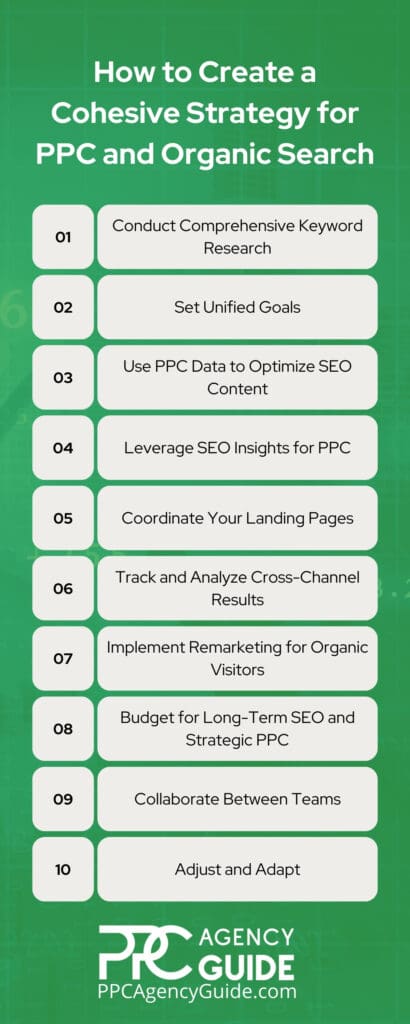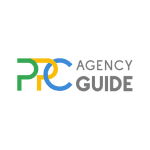
What if you could double your brand’s visibility on Google without doubling your budget? You actually can. The secret lies in the powerful synergy of pay-per-click (PPC) and search engine optimization (SEO) working together. On this page, we’ll explore how an integrated digital marketing strategy like this works and provide step-by-step instructions to help you start maximizing your results right away.
The Fundamentals of PPC and Organic Search
Before we get into integrating PPC and organic search strategies, let’s go over some basic information about what these things are and why businesses leverage them.
PPC Explained
PPC is a form of online advertising where businesses pay a fee each time their ad is clicked. Think of it as buying visits to your website rather than waiting for those visits to happen organically. Google Ads is the most common PPC platform, but PPC ads can also run on social media sites like Facebook and LinkedIn. The key benefit of PPC is its immediacy—you can get in front of potential customers quickly by paying for ad space at the top of search results or on social media platforms. Another advantage is that PPC allows businesses to precisely target their audience based on factors like location, demographics, and even interests.
Organic Search Explained
Organic Search, on the other hand, refers to the unpaid results that appear on search engines like Google. These are the websites and content that show up because they are relevant to what users are searching for, according to Google’s ranking algorithms. The main benefit here is trust and sustainability. Websites that rank high organically often get more clicks than paid ads because they are perceived as more trustworthy. Organic traffic is also more sustainable long-term, as you’re not paying for every click—though it does take time and effort to build up that ranking through tactics like SEO (Search Engine Optimization).
Prioritizing PPC vs. Organic Search
PPC and organic search are often pitted against each other. Part of the reason for the PPC vs. SEO debate is how differently they operate. PPC gives you instant visibility, while organic search takes time to build. Businesses with tight budgets sometimes see PPC as a quicker win, while those focused on long-term results lean towards organic search. There’s also a misconception that paying for ads could somehow undermine organic rankings, or that focusing on SEO will make PPC irrelevant. This creates a false narrative that you must choose one or the other. That said, in reality, they’re not opposing strategies at all—there’s a lot more value in using them together.
SEO and PPC Synergy
The synergy between PPC and organic search can create a powerful, well-rounded strategy that leverages the strengths of both approaches, delivering results that are better than using either one alone. Let’s break down why organic and paid search integration is so effective.
Increased Visibility and Brand Awareness
When your business appears in both paid ads and organic search results, you’re essentially dominating the search engine results page (SERP). This “dual presence” builds brand credibility and increases the likelihood that users will notice and remember your brand, even if they don’t click immediately.

Faster Data Insights for SEO
SEO typically takes time to show results, but PPC provides instant feedback. By testing keywords, ad copy, and landing pages through PPC campaigns, you can quickly see which elements drive conversions. These insights can then be applied to your SEO strategy, allowing you to optimize your organic content more effectively. For example, if certain keywords perform exceptionally well in PPC, you can focus your SEO efforts around them to strengthen your organic rankings.
Keyword Coverage
PPC and organic search can cover different stages of the buyer’s journey. Let’s say you’re targeting broad, informational keywords in your organic strategy to bring in users at the top of the funnel. Meanwhile, you can use PPC to focus on more transactional keywords that target users closer to making a purchase. This ensures you have a presence at multiple touchpoints, capturing audiences at various stages of intent.
Enhanced Click-Through Rate (CTR) and Conversion
Combining PPC and organic search doesn’t just increase your visibility—it can also enhance user trust. Users tend to view brands that rank in both areas as more credible. Having both a paid ad and an organic result reinforces your presence, making it more likely for a user to trust your brand and click.
Cost-Effective Strategy
While PPC can be expensive if relied on solely, it becomes more cost-effective when used in tandem with organic search. As your organic rankings improve, you can rely less on PPC for basic traffic and instead use it strategically for highly competitive keywords or targeted promotions. This means you’re not solely dependent on paid ads to drive traffic but can still leverage them when needed for maximum impact.
Improved Remarketing Opportunities
One of the lesser-known synergies between PPC and organic search is in remarketing. Organic search brings users to your site, but they may not convert right away. With PPC remarketing ads, you can retarget those users who’ve interacted with your site through organic search, keeping your brand top of mind as they move through the buying process.
Example of PPC and SEO Synergy in Action
Consider Amazon, which uses a highly integrated approach. They rank organically for millions of product-related keywords but also run PPC ads for key search terms. Their strategy isn’t about choosing one over the other. Instead, they leverage both to maintain dominance in the SERPs, ensuring their products are always front and center, regardless of whether a customer clicks an ad or an organic result.
By combining PPC and organic search, businesses can amplify their visibility, gather deeper insights, and boost overall performance across the board. It’s not about picking one strategy over the other—it’s about using them in tandem to maximize results.
Using SEO and PPC Together to Improve Performance
When you combine your SEO and PPC efforts, your brand benefits from the strengths of both strategies, working together to drive online visibility and maximize results. SEO is a long-term strategy, designed to organically improve rankings and drive sustainable traffic, while PPC campaigns offer immediate visibility by placing your business at the top of search engine results. This approach ensures coverage across all stages of the customer journey, from awareness to conversion.
SEO and PPC work together by sharing valuable data. Insights from PPC keywords can inform SEO strategies, helping businesses optimize their content around high-performing terms. In the same way, SEO analytics can uncover long-term trends that boost the performance of PPC campaigns, making both strategies more effective. Platforms like Google Search Console provide data that can refine your PPC strategy and improve targeting for both paid and organic efforts.
By integrating SEO and PPC, businesses not only increase their visibility in both paid and organic search results but also strengthen their overall online presence. This strategic synergy enhances brand credibility and improves the combined performance of PPC and SEO campaigns, ultimately boosting conversions.
How to Create a Cohesive Strategy for PPC and Organic Search
Developing a unified PPC and SEO strategy requires careful coordination, but when done correctly, it can significantly boost your digital marketing efforts. Next, let’s explore how to integrate PPC and SEO in a way that gives you the best of both worlds.
1. Conduct Comprehensive Keyword Research
PPC and SEO keyword strategies rely on targeting the right keywords, but they often approach this from different angles. The key here is to:
- Identify Common Keywords: Look for keywords that perform well in both organic and paid search, focusing on those that drive traffic and conversions. Tools like Google Keyword Planner or Ahrefs can help you identify these keywords.
- Segment Your Keywords: For PPC, focus on transactional keywords that have high purchase intent, while SEO can target a mix of informational and transactional keywords. The goal is to have coverage at all stages of the buyer’s journey.
For example, if you run an e-commerce store, your SEO might target “best laptops for graphic design” (informational), while PPC could focus on “buy MacBook Pro online” (transactional).
2. Set Unified Goals
Before getting into tactics, set clear goals that both your PPC and SEO teams can align with. Common goals include:
- Increase in Conversions: Whether from paid ads or organic traffic, the ultimate goal is to increase leads, sales, or whatever your desired action is.
- Boost Visibility on High-Value Keywords: Set a goal to appear in both organic and paid results for your top keywords.
- Lower Cost per Acquisition (CPA): By using SEO to capture traffic organically, you can lower the cost of paid conversions over time.
By unifying the goals, your teams will work together towards outcomes that benefit both sides.
3. Use PPC Data to Optimize SEO Content
PPC provides instant feedback on keyword performance, ad copy, and user behavior, which is invaluable for SEO optimization. Steps to take include:
- Analyze PPC Results: Look for keywords and ad copy that convert well and incorporate them into your SEO content strategy. For example, if you find that certain headlines or calls to action work well in PPC, test them in your meta descriptions or page titles for organic results.
- Identify Negative Keywords: Use negative keyword data from PPC to avoid irrelevant traffic. This can help your SEO team refine content so it doesn’t target queries that aren’t relevant.
For example, if a PPC ad for a specific product converts well, you can create an SEO-optimized blog post that targets the same audience, using similar messaging to capture organic traffic.
4. Leverage SEO Insights for PPC
SEO takes time, but it offers deep insights into what content resonates over the long term. You can:
- Identify High-Performing Content: If certain blog posts or product pages rank well organically, consider promoting them through PPC to boost visibility and capture more traffic in competitive spaces.
- Expand on Organic Success: For instance, if a piece of content starts ranking well for specific keywords, run targeted ads on those same keywords to drive even more traffic and increase conversions.
For instance, if a blog post on “top trends in sustainable fashion” ranks well, you could run PPC ads targeting the same keywords, promoting a product related to the trends mentioned.
5. Coordinate Your Landing Pages
Consistency is key. Ensure your PPC ads and organic search efforts lead to high-quality landing pages that are optimized for user experience and conversions. Some steps to take include:
- Optimize Landing Pages for Both Channels: Your PPC and organic visitors should land on pages with relevant, compelling content and clear calls to action. These pages should be fast, mobile-friendly, and have strong SEO fundamentals (like optimized headings and meta tags).
- A/B Test Landing Pages: Use PPC to test landing page variations. Once you find a page layout or content format that converts well, implement those insights into your broader SEO strategy.
6. Track and Analyze Cross-Channel Results
You need to measure the effectiveness of both PPC and SEO efforts, which can often overlap. Here’s what to track:
- Track Performance in Google Analytics: Set up tracking for both PPC and organic traffic in Google Analytics. You’ll want to look at metrics like conversions, time on site, and bounce rates for both channels.
- Monitor Attribution: Pay attention to multi-channel attribution reports to see how PPC and organic search assist each other. For instance, a user might discover your business through organic search but convert after clicking a PPC ad.
For example, a user might first visit your site through an organic blog post, then later be retargeted with a PPC ad for a related product, ultimately leading to a conversion.
7. Implement Remarketing for Organic Visitors
A powerful way to combine PPC and SEO is through remarketing. This involves serving ads to people who have already visited your site, often from organic search. To make this work:
- Set Up Remarketing Lists: In Google Ads or Facebook Ads, create remarketing lists based on organic visitors to specific pages, such as a product or blog post.
- Craft Custom Ads for Retargeting: Serve these users with tailored PPC ads that guide them back to your site, possibly offering a discount or free trial to encourage conversion.
8. Budget for Long-Term SEO and Strategic PPC
While PPC can drive quick results, SEO is a long-term investment. To create a balanced budget:
- Focus PPC Budget on Competitive, High-Intent Keywords: Use paid search to target competitive or expensive keywords where organic ranking is difficult.
- Invest in SEO for Evergreen Traffic: At the same time, keep investing in SEO to build organic rankings for less competitive, evergreen content that drives traffic over time.
For instance, a B2B software company might use PPC to target high-intent keywords like “enterprise CRM software” while using SEO to create informative content around related topics like “how to choose a CRM,” which will drive traffic and leads over time.
9. Collaborate Between Teams
Ensure your PPC and SEO teams are communicating and working together rather than in silos. Regular meetings and shared reports will help both teams understand how their efforts complement each other.
10. Adjust and Adapt
Finally, digital marketing strategies are never static. Monitor performance regularly and be prepared to make adjustments to your plan as needed. As you gather more data on what’s working in PPC and SEO, refine your tactics to improve results.
Get Help Developing a Strong PPC and SEO Combined Strategy
Integrating PPC with SEO isn’t always easy because each brand, audience, and product is unique. You need to have a deep understanding of both methods and the areas that make your offerings distinct to craft effective campaigns that maximize paid and organic search benefits. This is very difficult to achieve with in-house talent alone, but not all agencies possess these skills either. If you’d like to increase ROI with PPC and SEO, we’re happy to match you with a suitable agency at no cost to you. Request a complimentary consultation to take the first step.

FAQs on PPC and SEO Working Together
Why should I use both PPC and SEO together?
Combining PPC and SEO maximizes visibility, increases brand credibility, and captures traffic at multiple stages of the buyer's journey. PPC provides immediate insights and traffic, while SEO builds long-term, sustainable visibility. Blending SEO and PPC enhances overall performance and ROI.
How can PPC data improve my SEO strategy?
PPC provides instant feedback on keywords, ad copy, and landing pages, which you can use to optimize your SEO efforts. By analyzing which keywords and messaging perform best in PPC, you can refine your organic content strategy for better rankings and user engagement.
Can PPC and SEO work together to increase website traffic?
Yes, PPC and SEO complement each other by increasing your website’s presence on search engine results pages. When your site appears in both paid ads and organic results, it boosts visibility, click-through rates, and overall traffic, leading to higher conversions.
What are the benefits of integrating PPC and SEO?
Integrating PPC with organic search enhances brand visibility, improves trust, and provides comprehensive keyword coverage. It also offers valuable data for refining strategies, increases the likelihood of conversions, and creates cost-effective marketing by balancing immediate results with long-term growth.
How does using PPC and SEO together impact conversion rates?
Using PPC and SEO together can significantly improve conversion rates by ensuring your brand appears prominently in search results. This dual presence builds trust, encourages clicks, and increases the likelihood of conversions by targeting users at different stages of the buying journey.
Should I invest more in PPC or organic search?
The investment should depend on your goals. PPC is ideal for immediate traffic and testing, while organic search (SEO) builds long-term visibility. A balanced approach, where you invest in both organic search and paid search, ensures steady traffic and conversions, optimizing your overall digital marketing strategy.
What is the best way to balance PPC and SEO in my marketing strategy?
To balance PPC and SEO, start by identifying high-value keywords for both channels. Use PPC to target competitive or high-intent keywords and SEO for broader, long-term keyword strategies. Monitor performance regularly, adjusting budgets and tactics to ensure both channels complement each other.
How can I use PPC to boost my organic search rankings?
While PPC doesn’t directly boost organic rankings, it can indirectly help by increasing traffic, engagement, and brand awareness. PPC data on high-performing keywords and user behavior can inform your SEO strategy, leading to better content optimization and improved rankings.
What are the common challenges in combining PPC and SEO efforts?
Common challenges include budget allocation, coordinating teams, and ensuring consistent messaging. It’s crucial to align goals, share data, and regularly communicate between PPC and SEO teams to overcome these challenges and create a cohesive, effective strategy.
How can you enhance SEO with PPC?
PPC can enhance SEO by providing valuable data on keyword performance, user behavior, and conversion rates. This data can inform your SEO strategy, helping you optimize content, meta tags, and targeting for better organic rankings. PPC also increases brand visibility, driving more traffic to your site, which can improve engagement metrics—important factors in search engine rankings. Additionally, by testing ad copy and landing pages through PPC, you can identify what resonates with your audience and apply those insights to your SEO efforts, ultimately boosting your organic performance.
What are some PPC and SEO best practices?
For PPC, focus on thorough keyword research, use negative keywords to filter irrelevant traffic, and continually optimize your ad copy and landing pages based on performance data. Regular A/B testing is crucial to refine your strategy. For SEO, prioritize high-quality, relevant content, optimize on-page elements like titles, meta descriptions, and headers, and build a strong backlink profile. Both PPC and SEO benefit from targeting the right audience segments and using analytics to track performance. Integrating both strategies involves sharing insights—using PPC data to inform SEO keyword targeting and leveraging SEO content for PPC landing pages—ensuring a cohesive and effective approach across both channels.


















